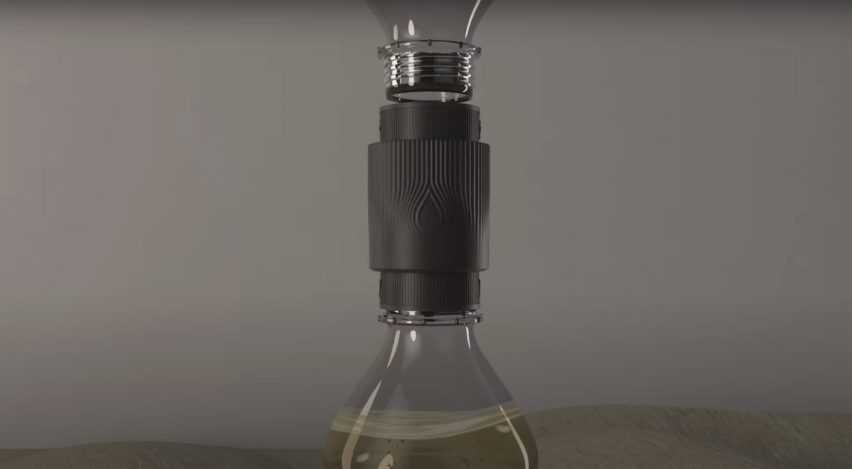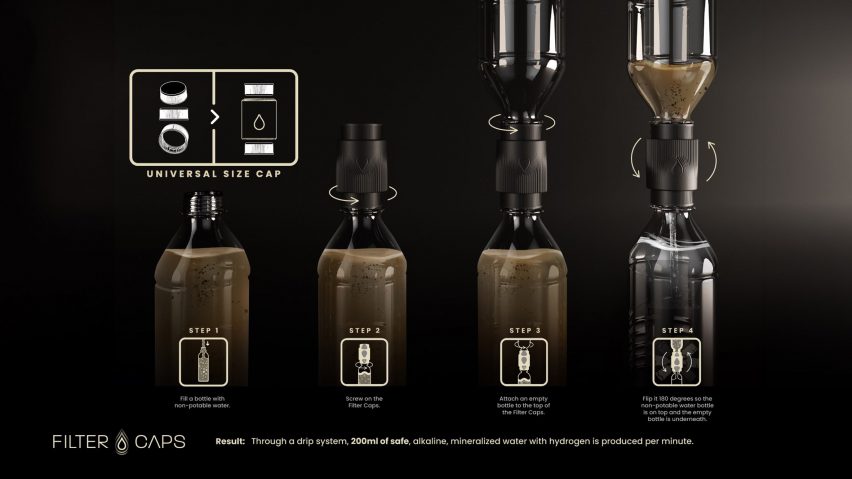Filter Caps transform bottles into handheld water treatment system
Published on by Water Network Research, Official research team of The Water Network in Business
Global design agency Ogilvy has developed a compact water filtration device that can attach to any plastic bottle, offering an accessible and affordable way to provide communities with clean drinking water.
The Filter Caps project was initiated by Ogilvy Colombia to address an issue that affects almost four million people in the country living in desert areas without essential hydration resources.
The company partnered with water treatment specialists Filsa to design a product that uses layers of metals, minerals and natural substrates to trap bacteria and impurities, finishing with a layer that mineralises the water.
The filtration process provides alkaline, mineralised and hydrogen-rich water that is safe for consumption. It also reduces cloudiness by 70 per cent and removes 90 per cent of heavy metals.
Ogilvy has designed a compact water filtration device that can attach to any plastic bottle
Ogilvy Colombia's chief creative officer Gastón Potasz, who led the project, told Dezeen that accessibility was a key objective for the design, as it needed to be easy to use by children who are often responsible for collecting water.
"Our goal is to generate impactful ideas with a clear purpose," said Potasz. "In this case, ensuring universal usability was crucial for scalability and increasing social impact."
"We concentrated on developing a device with unique characteristics, using specific components, ensuring that the device is 100 per cent biodegradable, lightweight, portable, simple to use and especially compatible with any bottle," he continued.
Each Filter Cap measures just six by four centimetres and weighs 24 grams, which minimises the need for expensive infrastructure and makes it easy to ship to areas where no other safe water system exists.
The caps use the universal PCO 28 millimetre thread found on the vast majority of plastic bottles, meaning they can transform almost any bottle into a filtering system.
Users fill a bottle with non-potable water then screw on the Filter Cap. A second bottle is attached to the top of the device and the system is then turned upside down so the filtered water fills the empty bottle at a rate of 200 millilitres per minute.
The Filter Caps are produced using 3D printing technology and are made from a corn starch-based resin. At the end of its life after approximately one year of use the casing can be composted.
The filtration process of non-potable water provides alkaline, mineralised and hydrogen-rich water safe for consumption
Ogilvy Colombia worked with non-profit organisation Baylor International and the Colombian Red Cross to distribute 1,000 Filter Caps to several native communities that suffer from health issues due to extreme heat insufficient infrastructure.
In this initial phase, the project has provided safe drinking water for 10,000 people, reclaiming over 300,000 litres of water in two months.
The team will continue expanding the distribution into new territories and the long-term objective is for Filter Caps to be supplied worldwide, providing crucial water access to the most vulnerable communities.
"Filter Caps has the mission of reaching every corner of the world," Potasz claimed. "We know the practical value it has to improve people's lives in vulnerable situations."
"This type of project with so much impact requires the participation of several actors to expand its full potential," he continued. "I am confident we will add more and more allies to help us achieve our goal."
Taxonomy
- Bottled Water
- Bottling

